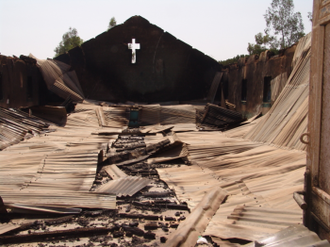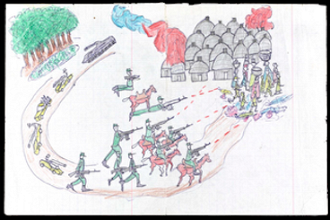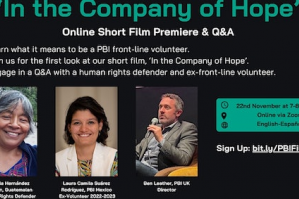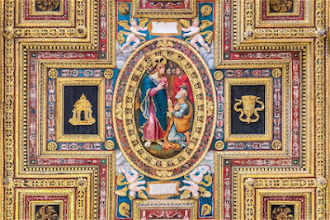Viewpoint: Africa - where are western Christians when we need them?

The spread of violent jihadist fundamentalism is exposing a chasm between Christians in Africa and the West. Christians under attack in Nigeria, Egypt, Sudan, Kenya and elsewhere are bewildered that their co-religionists in the relatively prosperous and safe world are not more engaged on their behalf. They also point to deeper doctrinal divisions making them feel isolated, despite the financial generosity of many congregations in Europe and North America.
The Reverend Canon Hassan John, director of media of the Anglican Diocese of Jos, Nigeria, and Vicar of St Christopher's Anglican Church, Rayfield, Jos, in besieged northern Nigeria, cites the West's obsession with political correctness, and its fear of offending the sensibilities of Muslims. "The West feels more comfortable when you say, 'Extremist Muslims' are attacking "communities in Africa" because then religion is swept under the carpet. They prefer it to sound like a tribal war or some local, ethnic conflict, rather than the bigger picture, which is a global Islamic agenda to eliminate Christians. The international NGOs working here prefer this narrative, too, because then they don't have to confront the uncomfortable truth about the genocidal intent of jihadists causing terror across Africa."
Western media usually describes the jihadist group, Boko Haram, as a campaign against western education. "They ignore the stated goal of Boko Haram, which is a war against Christians." The canon also believes Westerners fail to grasp the scale of the violence (approximately 50,000 killed in his region since 2000). "There is detachment, because when people find out about the horror being endured here, they have a responsibility to do something." To be fair, he accuses churches in southern Nigeria of apathy and disunity, suggesting they fear upsetting the nation's delicate political balance between Muslims and Christians.
A Rwandan pastor blames "the comfort syndrome." He believes Christianity in the West is too easy, whereas the church in China, for instance, has flourished in adversity. Western Christians have freedom and prosperity, and this has led to materialism, self-indulgence, depravity and decadence (gays, divorce, and abortion, for instance). "Islam, on the other hand, is an all-encompassing culture which reaches into all parts of daily life. It asks a lot of people, and makes them feel they belong to something bigger than themselves."
The American Anglican theologian Jeffrey Bullock concedes, "We've actually developed into radical individualists over the past several centuries. The divine has become a commodity for individualists that they can either take or leave. Even patriotism and nationalism have a consumer quality about them." He points out that Gakwandi's view of Western Christians is, ironically, little different from Muslim criticisms of Christianity.
When Bullock has invited African pastors to speak to his parishioners, he has seen how shocked Americans are by the embrace of both Old and New Testaments. "The notion that my members might be part of the Biblical story in a way Africans experience it would be quite alien. Most parishioners today have been immersed in historical suspicion. We have become thoroughly secularized."
Not that Christians in "the West" can claim to be united, or to understand each other. According to Evangelical human rights activist Bill Andress, "My general observation of continental Europeans is that they are no longer practicing Christians. In the United States we are moving in that direction. On Sundays many of our churches are full of social Christians. Obviously and fortunately there are many exceptions to this. But our entertainment industry has lowered moral standards; under the guise of academic freedom, many teachers no longer respect, even trample, traditional values."
His analysis is shared by many African Christians, and surveys on church attendance indicate Andress is correct. Although 40% of Americans claim they attend church regularly, only 20% actually do (1) "We are becoming a more insular society in which individuals tend to think that the world ends at their backyard fences, and their primary care is for their own well being and wealth. Adding to that is ignorance. Our education systems no longer value geography, world history, foreign languages, world literature and broadly enlightening subjects like these to the degree that they have in the past."
Despite Andress's view of European Christians, they do give more generously to developing world causes than Americans. Wander into any European church of any denomination, and there will be publications about their links with an African partner, as well as notices from faith-based charities or campaigns like Christian Solidarity Worldwide.
The same cannot be said in American churches. According to the NGO Empty Tomb, a hundred years ago US churches gave about 8% of their income to overseas missions. Now it is 2% (2). In 2015 Americans gave $373 billion to charity, (of which 71% came from individuals, as opposed to foundations or corporations). Of these donations, 32% went to religious institutions, while 4% went to international aid (3). This may be because Americans believe (wrongly) that the US government gives much more in foreign aid than it actually does. The average American thinks 26% of the federal budget goes on foreign aid, when the actual figure is less than 1% (4).
Aid to the Church in Need, Caritas, the Missionaries of Africa, the Marian Fathers, the Dominicans, the Franciscan Brothers and Sisters, among others do vital work in Africa, providing health and education where governments fail their own citizens. However, financial support for African projects is different from understanding the existential threat faced by people who are being killed because they stand by their faith. While congregations in the West may pray each Sunday for persecuted Christians around the globe, and while Christian human rights campaigns do their best to spread awareness, Christians in Africa know there is still a surprising degree of ignorance in the West. "They think of Africa as poor and disease-ridden," says a Rwandan social worker. "But the fact we are dying for our faith is lost among the guilt, generalizations and preconceptions about poverty and HIV."
It could also be that African Christian views on gays, family planning and divorce are so offensive to many Europeans and North Americans, Christian or otherwise, that it blinds them to atrocities endured by Africans who refuse to convert to Islam. However, Evangelicals in America and Europe who share African views are no more well-informed about the persecution of African Christians than non-Evangelical Christians. Nor are they more generous.
John Ashworth is special advisor to the South Sudanese Council of Churches. "I've lived in Africa for most of the last forty years and I am perplexed by western attitudes. Perhaps to engender empathy we have to couch the narrative in terms of human rights more generally of which attacks on Christians (or Muslims or any other religious group) is a subset. The cynical side of me says couch it in terms of western self-interest, as this seems to be the only thing that gets through to them, but I'm not sure how one would do that without pushing the buttons of western paranoia about immigrants, Islamism, etc."
At the moment Western progressive, human rights- based attitudes sometimes fail to grasp that in many African countries the church represents the nearest thing to authentic civil society. It stands up to dictators and kleptomaniac regimes; it dares to criticize when others -including other African leaders- are too timid.
According to Sudan experts Natalia Chan and Eddie Thomas, "The church in South Sudan has a long and historic role in facilitating dialogue and mediation, using its moral authority and credibility among a wide range of actors. Church-supported peace initiatives provide some hope for the future, not only in laying the foundations or providing an appropriate framework for dialogue, but also in informing a broader understanding of the complex context." (5)
Despite mutual misunderstanding and doctrinal differences, surely Christians in the more "comfortable" parts of the world have a duty to acknowledge the persecution of their co-religionists in Africa. Moreover, people of all faiths and none, including mainstream Western human rights groups, should call on political and religious leaders in the West to defend those being oppressed for their peaceful beliefs. To continue to turn away belittles us as human beings.
1. www.religion-online.org/showarticle.asp?title=237 ; 2. http://crockerchronicle.blogspot.com/2011/02/what-americans-give-to-churches.html ;
3. https://givingusa.org/see-the-numbers-giving-usa-2016-infographic/ ; 4. www.npr.org/sections/goatsandsoda/2015/02/10/383875581/guess-how-much-of-uncle-sams-money-goes-to-foreign-aid-guess-again ; 5. http://odihpn.org/magazine/south-sudan-wrong-turn-crossroads/
Editor's note:
Aid to the Church in Need's latest report issued on #Red Wednesday last November, gives comprehensive coverage of religious persecution around the world including reports from 51 countries in Africa. See:
www.indcatholicnews.com/news.php?viewStory=31606
Prince Charles condemns religious persecution in special video message
www.indcatholicnews.com/news.php?viewStory=31416
Report describes global impact of religious 'hyper-extremism





















